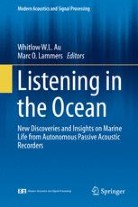
About this book series
Given the importance of acoustics to modern science, industry, and human welfare Springer presents this series of scientific literature. The series of monographs and reference books is intended to cover all areas of today’s acoustics as an interdisciplinary field.
We expect that scientists, engineers, and graduate students will find the books in Modern Acoustics and Signal Processing useful in their research, teaching and studies.
- Electronic ISSN
- 2364-4923
- Print ISSN
- 2364-4915
- Editor-in-Chief
-
- William M. Hartmann
- Series Editor
-
- Yoichi Ando,
- Whitlow W. L. Au,
- Arthur B. Baggeroer,
- Christopher R. Fuller,
- William A. Kuperman,
- Joanne L. Miller,
- Alexandra I. Tolstoy
Book titles in this series
-

-
The Technology of Binaural Understanding
- Editors:
-
- Jens Blauert
- Jonas Braasch
- Copyright: 2020
Available Renditions
- Hard cover
- eBook

-
Listening in the Ocean
- Editors:
-
- Whitlow W. L. Au
- Marc O. Lammers
- Copyright: 2016
Available Renditions
- Hard cover
- Soft cover
- eBook

-
Underwater Acoustic Signal Processing
Modeling, Detection, and Estimation
- Authors:
-
- Douglas A. Abraham
- Copyright: 2019
Available Renditions
- Hard cover
- eBook

-
Principles of Forensic Audio Analysis
- Authors:
-
- Robert C. Maher
- Copyright: 2018
Available Renditions
- Hard cover
- eBook

